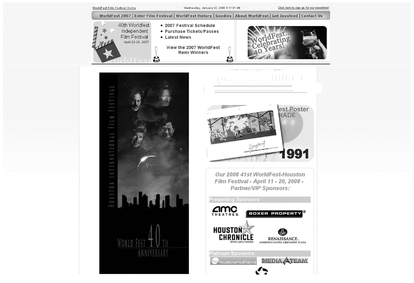63
It Could Happen: Festivals
Peter Biesterfeld

Figure 63-1
Showtime—your epic is finally done. The color corrections you meticulously crafted are perfect, and the audio tracks in the edit timeline are speckled with fades and dissolves—evidence of a carefully-blended soundtrack. You click on Save As and rip the project to DVD. It’s showtime.
Rambunctious friends and relatives, even the family dog, gather in front of the digital hearth for your premiere. As they’re hooting and hollering and throwing popcorn, you dare to wonder if there might be larger audiences in grander places who might appreciate your opus.
Try to imagine a packed nineteenth-century theatre where Mark Twain once gave a speech, and it’s your movie flickering up there on the digital silver screen. When the credits go up, there’s applause and questions about your film. During the schmooze-fest afterwards, a sales agent comes up to you and says she might be able to find a buyer for your movie. It could happen. But you have to work for it.
Filmfests: Why Not?
Without an audience, your movie is like the proverbial hand clapping in the forest. How does anybody know it exists? If you’re genuinely serious about finding an audience for your film, you have to stop thinking that finishing the movie is the end of your labors.
One of the best things you can do for your film and for your own development as a filmmaker is to have your movie screened at one of the several hundred festivals that dot the North American landscape.
Festivals can do three things for you: deliver audiences for your film, connect you to the industry marketplace and provide learning opportunities for improving your craft. Before launching into the do’s and don’ts of getting your film past programmers and screeners and in front of festival audiences, we should first pan across the terrain to explore what kinds of festival experiences are out there.
Festival Landscapes
Filmfest.com reports that, in the last ten years, the number of US festivals jumped from 450 to 650. One of the reasons for the jump is the new kids on the festival block. Boutique fests, student fests and online fests are not only boosting the numbers, but they’re also making distribution of original screen stories achievable for non-professional filmmakers. Some of the younger fests are grabbing a foothold by attracting a mix of pros, semipros and first-timers. The six-year-old Big Mini-DV Festival out of Long Island University, for example, encourages “filmmakers of all genres and technical levels” to submit their videos.
At the other end of the festival rainbow sit festivals with long traditions, such as the stately but vibrant WorldFest Houston Film Festival. Founded in 1961, WorldFest boasts that it gave Stephen Spielberg, George Lucas, Spike Lee, David Lynch and the Coen Brothers (among others) their first awards.
Festivals can also be niche fests programmed around issues, themes or regions. Take the Midwest Independent Film Festival, which will consider films of all lengths and genres, but prefers submissions from “the eight-state region of Illinois, Indiana, Iowa, Michigan, Minnesota, Missouri, Ohio and Wisconsin.”
The goal of your submission is to have it selected from a competing crop and win an award in one of the categories. Although most festivals are competitions, there are non-competitive events, such as the Tulsa Overground. This combination film and music event bills itself as “a festival for the people, by the people. A cinematic grab bag of first-time filmmakers, student directors, professional lensers and big name auteurs.” “Anything goes” programmers at the Overground accept only shorts and caution that only two hours of films are screened each night, so the shorter your film, the better its chances for selection.
Once your film is accepted, most festivals will give you an industry pass. This gets you into the formal and informal sessions where filmmakers of all stripes get to mix with industry pros, distributors and sales agents. Whether it’s a Q-and-A session with a seasoned filmmaker after a screening, an industry panel on current trends or a boot camp on distribution and marketing, you’ll find these sessions indispensable to your career trajectory.


Figure 63-2, 63-3 and 63-4 There’s a festival for everyone nowadays, but make sure you read all the rules. For instance, if you’re submitting for teen viewers, you might get rejected if your subjects are smoking, no matter how good your video is. Know your target; they set the rules, not you.
Festival 101
Festival pros suggest you should know what you want your submission to achieve before you submit it: Is it to get you an agent or a publicist? Or is it to make enough of a splash to get you invited to other festivals? Perhaps you want a distributor or broadcaster to notice your film, because you want to tap them for participation in your next film.
Those who unpack and screen your epic say that wrapping your submission copy in a glossy marketing package is not the way to get their attention. Filmfest mythology has it that the fancier the package, the more the buzz. Don’t believe it. Put your heart and attention into your film, not into the wrapper. What interests festival screeners and selection committees is the quality of your storytelling. But if they like your film and select it for competition, you will want to be ready with a high-quality screening copy and a press kit.
If you’re too busy making your movie and haven’t got the time to market it, get somebody on your team to do it. Right from the outset somebody has to be on festival alert, sniffing out the details of submission criteria and deadlines and preparing an information kit about your film. Start shooting production photos early—you never know.
Many festivals don’t accept direct submissions anymore and prefer you go through an online festival submission service. Withoutabox.com is the biggest of the one-stop online festival submission supermarkets. Its signature product, the International Film Submission System, gives beginning filmmakers and Academy Award winners alike access to over 1,200 international festival markets. “We help filmmakers navigate the film festival submission process and make informed and well-researched decisions about their film festival entry choices,” says the website.
Festival veteran and Withoutabox junkie, Murphy Gilson, has had his short film Partially True Tales of High Adventure! accepted by over 20 festivals around the world, including Cannes’

Figure 63-5 Withoutabox is a very powerful ally for the budding film festival producer. Everything you need to get started, without the confines of a distribution agency.
Short Film Corner. The Culver City-based director and writer has these words of wisdom for festival newbies:
“Your DVD is how people think of you as a filmmaker. Are you going to submit a professionally-made disc or some sloppy Sharpie-scribbled thing they lose in their car? A successful festival visit is not only about your screening”.
Murphy tells us these points to consider when trying to break into the festival world:
- Go to other screenings and stay for the Q&As and meet other filmmakers.
- Go to the panels and the forums.
- Try to meet distributors, agents and producers.
- Follow up. Go through all the business cards, and send a “nice to meet you” email.
- Promote your film, but don’t make an *** of yourself. Seinfeld in a bee suit is funny. A nobody in a bee suit is creepy.
As a final point, Murphy adds, “Don’t get too attached to rejection. There are probably a dozen valid reasons why your film was rejected that have nothing to do with the quality of your film.”
Submissions: The Final Word
Local programmers pride themselves on bringing something new and fresh to their audiences, and they like to write “premiere” next to an entry’s title in the program. But, if your piece has been widely available through the World Wide Web, festival directors can’t do that. However, many festivals are more lenient when it comes to short subject films, and there are many who won’t insist on the first-time rule. As well, there are plenty of exclusively short film fests out there looking for your “previously enjoyed” masterpiece. Read the rules to see where you fit.
Credit Roll
Excellence is what will get your submission past festival gatekeepers and into the hearts of audiences and jurors. An informal email survey of festival pros all concurred that what programmers and screeners are generally looking for is “quality storytelling, quality performances and intriguing and slightly unconventional docs.”
If you want to get plugged into the film festival scene and plan for your first submission, visit online festival forums and discussion groups. You should also check out the festival “idiot guides” and other how-to books available on bookstore and library shelves.
Happy browsing. May all your submissions be worthy. May all your audiences be delighted. And may you hoist a statuette or two.



